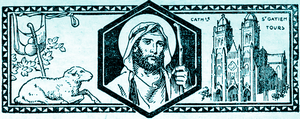Lives of the Saints
Our Models and Protectors
Spiritual Bouquet:
December 18

Saint Gatian
First Bishop of Tours
(† First Century)
Saint Gatian, a disciple of the Apostles and the first bishop of Tours, was sent to that city at the same time as Saint Denys to Paris, Saint Trophimus to Arles, Saint Martial to Limoges, Saint Saturninus to Toulouse, Saint Sergius Paulus to Narbonne, and Saint Austremoine into Auvergne. The Gauls in that region were addicted to the worship of their ancient idols, to which they had added the divinities of Rome. He found them enslaved to their various superstitions, and began to teach them the vanity of idols and the impossibility of a plurality of gods. After dispersing the false ideas and fears they had conceived concerning the gods of the empire, he presented to them the faith of the Gospel and the true God. He showed them the necessity of the Redemption and spoke of the Second Coming of the Saviour as Judge, when He will reward the virtue of those who have done good, and exile evildoers to a lamentable eternity.
The Saint was often interrupted in his instructions by harassers, and when denounced to the magistrates, was mistreated and threatened with death; but no contradictions or sufferings were able to discourage or daunt this apostle. By his perseverance he gained several to Christ. He left the city, however, and established a sort of headquarters in a rude grotto surrounded by thorn bushes. There he celebrated the divine mysteries. His splendid virtues, until then unknown to this untaught populace, won many to recognition of the truth of the religion he taught. He traveled in the area, accompanied by his faithful disciples, to preach and to exercise mercy. There were, it seems, no illnesses which he did not cure, nor demons which he did not drive away with the sign of the Cross. The pagan altars began to be abandoned, and it was permitted to establish small oratories where the faithful could assemble. The people learned to sing the praises of the true God, and clerics were formed to officiate. Saint Gatian established outside the city, a cemetery for the burial of Christians.
The holy bishop Gatian died at an advanced age, having seen Our Lord Jesus Christ come to him during his last illness to awake him from sleep and give him Holy Communion in Viaticum; he died seven days later. The Cathedral of Tours still possesses a few fragments of his relics, which Saint Martin had placed in that principal church, but which wars and persecutions scattered and destroyed in large part.
Les Petits Bollandistes: Vies des Saints, by Msgr. Paul Guérin (Bloud et Barral: Paris, 1882), Vol. 14